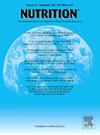Fiber, lactose and fat-modified diet for the prevention of gastrointestinal chemo-radiotherapy-induced toxicity in patients with cervical cancer: Randomized clinical trial
IF 3.2
3区 医学
Q2 NUTRITION & DIETETICS
引用次数: 0
Abstract
Background
The most frequent early gastrointestinal (GI) toxicity symptoms are nausea (58%), diarrhea (46.7%), and vomiting (45.5%) in patients with cervical cancer (CC). Approximately 90% of patients undergoing abdominopelvic radiotherapy present with changes in the GI tract, such as degenerative alterations in mucosal epithelial cells and nutrient malabsorption.
Objective
To evaluate the effect of a diet modified in fiber, lactose, and fat on the prevention of chemoradiotherapy (QTRT)-induced GI toxicity compared to the usual prescription in women with locally advanced CC.
Methods
A total of 134 women with a confirmed diagnosis of CC in locally advanced stages (IB2-IVA) were included in a randomized clinical trial conducted between February 2017 and March 2020. The intervention group (IG) received a modified diet of fiber, lactose, and fat, while the usual prescription group (UP) followed habitual nutritional recommendations. Toxicity was measured using the Common Terminology Criteria for Adverse Events (CTCAE) v4.
Results
A total of 134 women were included in the IG (65) and UP (69) groups. The mean age in the IG and UP groups were 47.2±13.4 and 49.7±14.2 years, respectively. Radiotherapy doses received by the IG and UP groups were 50.1±6.7 and 49.9±4.6 Gy, respectively. IG had a lower risk of presenting with mild constipation compared to the UP (hazard ratio: 0.46, 95% confidence interval: 0.28–0.76, P<0.01).
Conclusion
Patients with locally advanced stages of CC undergoing QTRT who received fiber, lactose, and fat-modified diet may have a lower risk of mild constipation during abdominal radiotherapy.
纤维、乳糖和脂肪改良饮食预防宫颈癌患者胃肠道放化疗毒性:随机临床试验
背景:宫颈癌(CC)患者最常见的早期胃肠道(GI)毒性症状是恶心(58%)、腹泻(46.7%)和呕吐(45.5%)。大约90%接受盆腔放疗的患者出现胃肠道改变,如粘膜上皮细胞退行性改变和营养吸收不良。目的:评价纤维、乳糖和脂肪改良饮食对局部晚期CC女性化疗(QTRT)诱导的胃肠道毒性的预防作用,与常规处方相比。方法:在2017年2月至2020年3月进行的一项随机临床试验中,共纳入134名确诊为局部晚期CC (IB2-IVA)的女性。干预组(IG)接受由纤维、乳糖和脂肪组成的改良饮食,而常规处方组(UP)则遵循惯常的营养建议。使用不良事件通用术语标准(CTCAE) v4测量毒性。结果:IG组(65例)和UP组(69例)共134例。IG组和UP组的平均年龄分别为47.2±13.4岁和49.7±14.2岁。IG组和UP组放疗剂量分别为50.1±6.7 Gy和49.9±4.6 Gy。与UP组相比,IG组出现轻度便秘的风险较低(风险比:0.46,95%可信区间:0.28-0.76)。结论:接受QTRT的局部晚期CC患者接受纤维、乳糖和脂肪修饰饮食可能在腹部放疗期间出现轻度便秘的风险较低。
本文章由计算机程序翻译,如有差异,请以英文原文为准。
求助全文
约1分钟内获得全文
求助全文
来源期刊

Nutrition
医学-营养学
CiteScore
7.80
自引率
2.30%
发文量
300
审稿时长
60 days
期刊介绍:
Nutrition has an open access mirror journal Nutrition: X, sharing the same aims and scope, editorial team, submission system and rigorous peer review.
Founded by Michael M. Meguid in the early 1980''s, Nutrition presents advances in nutrition research and science, informs its readers on new and advancing technologies and data in clinical nutrition practice, encourages the application of outcomes research and meta-analyses to problems in patient-related nutrition; and seeks to help clarify and set the research, policy and practice agenda for nutrition science to enhance human well-being in the years ahead.
 求助内容:
求助内容: 应助结果提醒方式:
应助结果提醒方式:


